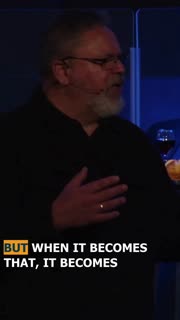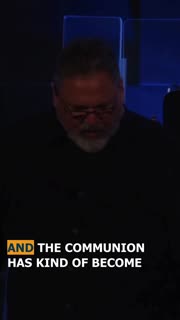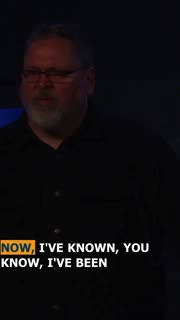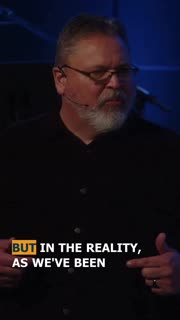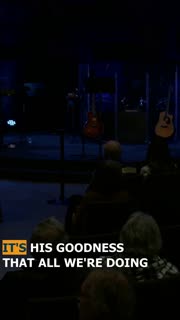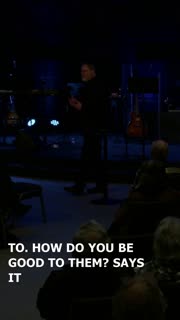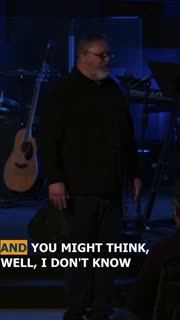Embracing Communion and the Essence of Goodness
Devotional
Sermon Summary
Bible Study Guide
Sermon Clips
1. "But when it becomes that, it becomes less. It gets weakened. It becomes just an act. And the reality is this relationship with Jesus Christ is literally that, it's a relationship. And there's a whole lot more depth and meaning than what we would ever see on the surface. You know? It's whether it's Communion. Today I'm talking about Communion. Or whether it's serving in a church. Serving in the church, serving in the children's area, children's ministry, serving in the nursery, is not just about wiping noses and changing diapers. There's so much more that goes on. There's so much more that happens." [00:35:22] (56 seconds)
2. "And the Communion has kind of become that. I mean, I remember ever since I was a little kid, we did Communion on the first Sunday of every month. That's just what you do. You know, you plan for it. You show up. In some churches, it's the highest attendance of the whole month. Because people, they can skip for all the other reasons. but you know what let's communion sunday we probably should go well it's not about the act of communion it's about communion it's about relationship hallelujah luke chapter 22 begin with verse 14 says and when the hour came he this is talking about jesus reclined at table and the apostles with him and he said to them i have earnestly desired to eat this passover with you before i suffer now understand that part of this this communion that we take you know the the cracker and the juice this however you do it you know whether it's bread and wine or whether it's i've heard of saltine crackers and coke i had a i heard somebody and it wasn't they weren't being disrespectful it's what they had but it didn't become about the ritual that it had to be a kosher cracker and a and a and a certain kind of juice or wine it became about communion about relationship so so what no matter this is in representation of the passover meal and there's so much man i just i couldn't possibly go into the depth of of what that that piece of of bread that piece of cracker represents in the jewish tradition and and there you know we we've had a a seder meal here where where you had we had somebody go through what each one of the parts would be and there's been other teachings and i've shared some over over the years but that that piece of bread that cracker wasn't just any piece of bread or cracker it was it was a specific low is one it's a specific piece out of the three loaves there were three loaves and and a I mean, I could go for hours. I'm not going to." [00:36:30] (143 seconds)
3. "Now, I've known, you know, I've been doing this for years, 35 plus years. And I've done. I've led. I've led communion services for hundreds and hundreds and hundreds of times, literally. And I've known people who come to church or to a meeting where communion is, and they won't partake of it. Because they don't feel worthy. And I've noticed it. And it's not like I'm watching everybody. Well, who took the bread and the wine? I don't know. But I notice, and I've talked to many people. I said, so why aren't you, why don't you receive communion? And they said, oh, I just, I can't. I can't. If you know what I've done, if you know who I am outside of here, I just can't. And I'm going to be honest with you, that broke my heart. That breaks my heart. Because that's not the heart of communion." [00:41:21] (68 seconds)
4. "If you're here this morning, and you feel like somehow you've disqualified yourself from being able to do this, what that really means, what you're really saying to yourself is, I've somehow disqualified myself from the love of God. And that's not true. You're still breathing. If you're saying, if you can't receive communion, and you can't, you know, you're saying you've disqualified yourself, maybe you're even thinking I've disqualified myself from the whole thing of salvation. See, and I am positive. I mean, I've thought about this a lot. Jesus was giving Judas one more chance. Judas didn't have to. He didn't have to get up from the table when he said, go do quickly. He could have said, nah, it's okay. But Judas had already hardened his heart. So this morning, don't harden your heart." [00:42:42] (73 seconds)
5. "It's impossible to do it without love. It's impossible to decide. You can't just decide in yourself. Now, people can be good. We use the word all the time. It's good. You're good. You're a good kid. You're a good... and so on. But when Jesus, even Jesus, was called good, how did He reply? He goes, why do you call me good? He says, He says, no one's good. Huh. Isn't that interesting? If anybody could have said, well, I'm good. Well, even Jesus says, He says, only God is good. And that's the reality, is that your goodness, anything that you do good out of yourself, Paul said, is filthy rags. Why? Because most of what human beings, most of the goodness that we do is based out of selfishness. We're good for a reason. We're good for a purpose. I'll be good if the other person is good." [01:04:42] (71 seconds)
6. "But in the reality, as we've been seeing, God is love and He loves everybody. There's not a single person that lives on this earth that He doesn't love. There's not a single person that's ever lived on this earth. There's not a single person that lives on this earth that He didn't love. That is a kind of love that is well beyond us. It's well beyond our ability to live that way. But the truth is, He wants us to walk in love. And so He showed us love first, and then we're supposed to walk in love. Now, it is possible to be good. But the only way it's possible to be good is to follow what He did and what He did. What He does, and we're going to talk about that, what He continues to do on a daily basis that shows us His goodness." [01:06:09] (55 seconds)
7. "It's His goodness that all we're doing is reflecting it. It's His goodness that we receive it, we experience it, and then we can reciprocate That's a hard word. We can reciprocate to others a friend of mine posted this last week and and on on facebook and and he he says you know this person says god get away from me leave me alone uh you know i hate you and then god says well i love you anyway and i died for you know sent jesus to die on the cross and the and the the the cartoon person repents and he goes god you're so good he says you're so amazing he says how how can i repay my my my my thanks and my my my gratitude for what you've done for me and just then somebody threw a mud ball at him and hit him and the and the voice says love him the only way that we can really express our gratitude for what what jesus has done is to love the person that you're next to wherever you are that is wherever that is it's not just the person next to you right this moment although that probably will apply in most relationships and marriages especially and especially in young adults and you know teenagers i mean junior high anybody in junior high middle school sorry i used the wrong term oh yeah oh yeah is junior high not a politically correct word anymore i don't know i didn't middle school middle school okay middle middle school is dangerous it's like a scary place man i remember when our kids went through middle school it's like man every day was a traumatic experience well even there we're supposed to show love and goodness to the very people who are hurting us and that's that's crazy" [01:07:51] (127 seconds)
8. "How do you be good to them? Says it right here, show honor. Honor them. Honor them. Which, okay, how do you honor somebody who's hard to get along with in your workplace? Listen to them. Really listen to them. Don't just, don't just go, yeah, yeah, yeah, yeah, I know, I heard your opinion before. I get it. No. You listen to that person. It's amazing. My wife, years ago, we were still in college and she was working a job at the YMCA camp. And there was a man there who was homosexual. And he was a nice enough guy. He was a great guy. I mean, we all liked him. He was a nice man. And he was a little, he could be a little forceful in his feelings. He was always a little, he was a little forceful in his pushing that you have to be accepting of him. And when Debbie started working there, he, for some reason, no, I know why, because she's good, is he started to take a liking, and he started teasing her. I mean, he started messing with her, kind of, not teasing mean, but just kind of, you know, and talking and talking. And by the end of that summer, she was the only person who could reach him. And the reason she reached him is she was just being good to him. Everybody else would start, he'd start talking and they'd walk away. She would just stand there and talk to him and listen." [01:13:24] (108 seconds)
9. "And by the end of that summer, by the end of the summer, he was telling her stuff that, well, he says, I'm going to be honest with you, I used to go to church, I used to be a believer. But he says, when the church that I was in found out that I was a homosexual, they kicked me out. Well, that's not good. That's not being honorable. Listening, even though they have different views, even though they have a different way of living their lives, until they're dead, they're still reachable. And how do you reach them? Well, the Bible says it's the goodness of God that draws men to repentance. The sinners, the sinners wanted to be around Jesus. They looked for him. They wanted to hang out with him. Why? Because he was good to them. It's the goodness of God. But when you're good to somebody who nobody else respects, they're going to be drawn to you." [01:15:10] (69 seconds)
10. "And you might think, well, I don't know that I want to put up with that. I don't know if I want to spend time with them. Okay, that's not good. You're not showing honor at that moment. You're not honoring them. You're not showing the good. The best way to show the goodness of God is, okay, I'm going to listen to you. Lord, give me grace, man. Help me. Because it's going to be hard to honor them. I've had conversations with people who never did make sense. It was a complete waste of my time. And as a friend of mine once said, I'm dumber now because they talked. Because that person talked to me. But the reality is, that may be the only goodness they experience all day long. All week long. Outdo one another in showing honor. Verse 11, do not be slothful in zeal. Be fervent in spirit. Serve the Lord." [01:16:26] (69 seconds)
Ask a question about this sermon
2. "And the Communion has kind of become that. I mean, I remember ever since I was a little kid, we did Communion on the first Sunday of every month. That's just what you do. You know, you plan for it. You show up. In some churches, it's the highest attendance of the whole month. Because people, they can skip for all the other reasons. but you know what let's communion sunday we probably should go well it's not about the act of communion it's about communion it's about relationship hallelujah luke chapter 22 begin with verse 14 says and when the hour came he this is talking about jesus reclined at table and the apostles with him and he said to them i have earnestly desired to eat this passover with you before i suffer now understand that part of this this communion that we take you know the the cracker and the juice this however you do it you know whether it's bread and wine or whether it's i've heard of saltine crackers and coke i had a i heard somebody and it wasn't they weren't being disrespectful it's what they had but it didn't become about the ritual that it had to be a kosher cracker and a and a and a certain kind of juice or wine it became about communion about relationship so so what no matter this is in representation of the passover meal and there's so much man i just i couldn't possibly go into the depth of of what that that piece of of bread that piece of cracker represents in the jewish tradition and and there you know we we've had a a seder meal here where where you had we had somebody go through what each one of the parts would be and there's been other teachings and i've shared some over over the years but that that piece of bread that cracker wasn't just any piece of bread or cracker it was it was a specific low is one it's a specific piece out of the three loaves there were three loaves and and a I mean, I could go for hours. I'm not going to." [00:36:30] (143 seconds)
3. "Now, I've known, you know, I've been doing this for years, 35 plus years. And I've done. I've led. I've led communion services for hundreds and hundreds and hundreds of times, literally. And I've known people who come to church or to a meeting where communion is, and they won't partake of it. Because they don't feel worthy. And I've noticed it. And it's not like I'm watching everybody. Well, who took the bread and the wine? I don't know. But I notice, and I've talked to many people. I said, so why aren't you, why don't you receive communion? And they said, oh, I just, I can't. I can't. If you know what I've done, if you know who I am outside of here, I just can't. And I'm going to be honest with you, that broke my heart. That breaks my heart. Because that's not the heart of communion." [00:41:21] (68 seconds)
4. "If you're here this morning, and you feel like somehow you've disqualified yourself from being able to do this, what that really means, what you're really saying to yourself is, I've somehow disqualified myself from the love of God. And that's not true. You're still breathing. If you're saying, if you can't receive communion, and you can't, you know, you're saying you've disqualified yourself, maybe you're even thinking I've disqualified myself from the whole thing of salvation. See, and I am positive. I mean, I've thought about this a lot. Jesus was giving Judas one more chance. Judas didn't have to. He didn't have to get up from the table when he said, go do quickly. He could have said, nah, it's okay. But Judas had already hardened his heart. So this morning, don't harden your heart." [00:42:42] (73 seconds)
5. "It's impossible to do it without love. It's impossible to decide. You can't just decide in yourself. Now, people can be good. We use the word all the time. It's good. You're good. You're a good kid. You're a good... and so on. But when Jesus, even Jesus, was called good, how did He reply? He goes, why do you call me good? He says, He says, no one's good. Huh. Isn't that interesting? If anybody could have said, well, I'm good. Well, even Jesus says, He says, only God is good. And that's the reality, is that your goodness, anything that you do good out of yourself, Paul said, is filthy rags. Why? Because most of what human beings, most of the goodness that we do is based out of selfishness. We're good for a reason. We're good for a purpose. I'll be good if the other person is good." [01:04:42] (71 seconds)
6. "But in the reality, as we've been seeing, God is love and He loves everybody. There's not a single person that lives on this earth that He doesn't love. There's not a single person that's ever lived on this earth. There's not a single person that lives on this earth that He didn't love. That is a kind of love that is well beyond us. It's well beyond our ability to live that way. But the truth is, He wants us to walk in love. And so He showed us love first, and then we're supposed to walk in love. Now, it is possible to be good. But the only way it's possible to be good is to follow what He did and what He did. What He does, and we're going to talk about that, what He continues to do on a daily basis that shows us His goodness." [01:06:09] (55 seconds)
7. "It's His goodness that all we're doing is reflecting it. It's His goodness that we receive it, we experience it, and then we can reciprocate That's a hard word. We can reciprocate to others a friend of mine posted this last week and and on on facebook and and he he says you know this person says god get away from me leave me alone uh you know i hate you and then god says well i love you anyway and i died for you know sent jesus to die on the cross and the and the the the cartoon person repents and he goes god you're so good he says you're so amazing he says how how can i repay my my my my thanks and my my my gratitude for what you've done for me and just then somebody threw a mud ball at him and hit him and the and the voice says love him the only way that we can really express our gratitude for what what jesus has done is to love the person that you're next to wherever you are that is wherever that is it's not just the person next to you right this moment although that probably will apply in most relationships and marriages especially and especially in young adults and you know teenagers i mean junior high anybody in junior high middle school sorry i used the wrong term oh yeah oh yeah is junior high not a politically correct word anymore i don't know i didn't middle school middle school okay middle middle school is dangerous it's like a scary place man i remember when our kids went through middle school it's like man every day was a traumatic experience well even there we're supposed to show love and goodness to the very people who are hurting us and that's that's crazy" [01:07:51] (127 seconds)
8. "How do you be good to them? Says it right here, show honor. Honor them. Honor them. Which, okay, how do you honor somebody who's hard to get along with in your workplace? Listen to them. Really listen to them. Don't just, don't just go, yeah, yeah, yeah, yeah, I know, I heard your opinion before. I get it. No. You listen to that person. It's amazing. My wife, years ago, we were still in college and she was working a job at the YMCA camp. And there was a man there who was homosexual. And he was a nice enough guy. He was a great guy. I mean, we all liked him. He was a nice man. And he was a little, he could be a little forceful in his feelings. He was always a little, he was a little forceful in his pushing that you have to be accepting of him. And when Debbie started working there, he, for some reason, no, I know why, because she's good, is he started to take a liking, and he started teasing her. I mean, he started messing with her, kind of, not teasing mean, but just kind of, you know, and talking and talking. And by the end of that summer, she was the only person who could reach him. And the reason she reached him is she was just being good to him. Everybody else would start, he'd start talking and they'd walk away. She would just stand there and talk to him and listen." [01:13:24] (108 seconds)
9. "And by the end of that summer, by the end of the summer, he was telling her stuff that, well, he says, I'm going to be honest with you, I used to go to church, I used to be a believer. But he says, when the church that I was in found out that I was a homosexual, they kicked me out. Well, that's not good. That's not being honorable. Listening, even though they have different views, even though they have a different way of living their lives, until they're dead, they're still reachable. And how do you reach them? Well, the Bible says it's the goodness of God that draws men to repentance. The sinners, the sinners wanted to be around Jesus. They looked for him. They wanted to hang out with him. Why? Because he was good to them. It's the goodness of God. But when you're good to somebody who nobody else respects, they're going to be drawn to you." [01:15:10] (69 seconds)
10. "And you might think, well, I don't know that I want to put up with that. I don't know if I want to spend time with them. Okay, that's not good. You're not showing honor at that moment. You're not honoring them. You're not showing the good. The best way to show the goodness of God is, okay, I'm going to listen to you. Lord, give me grace, man. Help me. Because it's going to be hard to honor them. I've had conversations with people who never did make sense. It was a complete waste of my time. And as a friend of mine once said, I'm dumber now because they talked. Because that person talked to me. But the reality is, that may be the only goodness they experience all day long. All week long. Outdo one another in showing honor. Verse 11, do not be slothful in zeal. Be fervent in spirit. Serve the Lord." [01:16:26] (69 seconds)
